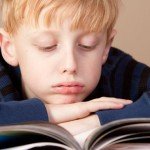My 16-year-old son Haley recently came into my office and announced that he’d finished a 600-page manuscript. I suppose that would be unusual coming from any 16-year-old, but given my son’s background, it’s especially stunning.
Haley is ADHD and dyslexic. At 7, he hated school. He would hide under the dining-room table to avoid reading or doing his homework. My novels about Percy Jackson began as bedtime stories for him — a father’s desperate attempt to keep his son interested in reading. That’s also why I made Percy Jackson ADHD and dyslexic, and made those two conditions indicators of Olympian blood.
Over the past nine years, so much has changed. Percy Jackson became a five-book series. Haley took his own hero’s journey from reluctant reader to an avid devourer of books. Now, as I launch a new series, The Heroes of Olympus, that returns to Percy Jackson’s world, it seems an appropriate time to reflect on what I’ve learned about getting ADHD/dyslexic kids to read. I can’t promise that every child with learning differences will become a novelist, but I do think all children can become lifelong readers. Below are four essential things I’ve learned as a dad and a classroom teacher:
-
Model reading at home.
If the parents are too busy to read, it’s a safe bet the children will feel the same way. Set aside time for family reading each night. It doesn’t matter so much what the kids read, as long as you provide them space for reading and a sense that it is a valuable part of your daily routine. Sometimes the Riordan family will read books together. Sometimes we’re all reading different things. But we value books, and we have great conversations about our favorite authors and stories.
-
Match your children with the right books.
By the “right” books, I mean the ones that will leave them wanting to read more. Every child’s taste is different. Don’t worry if they’re not reading War and Peace at age 12. First, build a good foundation and a positive attitude about reading by letting them pick the stories they enjoy. Make friends with a bookseller or librarian. They are a wealth of information on finding books that kids enjoy.
-
Create a productive environment for reading.
Usually, this means few distractions. Reading with music or TV? Not such a great idea. On the other hand, many ADHD kids can focus better if they can have something to fiddle with like a stress ball, an eraser, or some other small object that absorbs their kinesthetic energy. Let your child participate in finding the most comfortable space to read — a chair, a sofa, a loft, a patio.
-
Most important, keep the long view.
Your child will grow up to be a successful person. ADHD and dyslexia really are differences, not disabilities. A disproportionate number of millionaires are dyslexics. ADHD adults are valuable in the workplace because they can focus like a laser on things that really interest them. Kids with learning differences naturally become out-of-the-box thinkers, because they have to find different ways to solve problems. If we can get these kids through the school years, they will excel.
Take it from this dad. It seems like just yesterday my son was hiding under the table to avoid reading. Now he’s writing books longer than mine!
For more on The Heroes of Olympus, go here.
This essay first appeared at WSJ.com/Speakeasy. Reprinted with permission.






